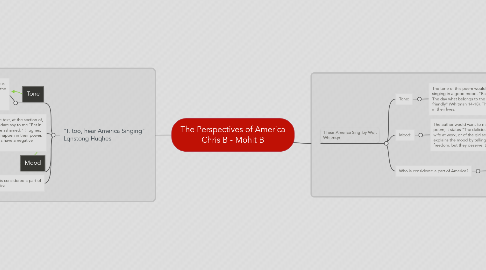
1. "I, too, hear America Singing" Lqnstong Huqhes
1.1. Tone
1.1.1. The attitude of the text in "I, too, hear America Singing" is somewhat of a serious manner because of the problem or story this individual is going through. "I am the darker Brother. They send me to eat in the kitchen when company comes, but I laugh and eat well, and grow strong." (Hughes, 1) This phrase is an example of how this person is personally 'uncomfrtable' to his act.
1.2. The way the reader feels throughout text can be confident. In the text, at the section of, "Tomorrow, I'll be at the table when company comes. Nobody'll dare say to me "Eat in the kitchen," then. Besides, They'll see how beautiful I am and be ashamed." (Hughes, 1) This is a phrase of somebody who is determine to not let this happen in their power. For which this person feels good about themselves, even if others have a negative opinion.
1.3. Mood
1.4. Who is considered a part of America
2. ¨I hear America Sing¨ by Wqlt Whitmqn
2.1. Tone:
2.1.1. The tone of this poem would be cheerful because the people of this poem are singing in a good mood. "Each singing what belongs to him or her and to none else, The day what belongs to the day—at night the party of young fellows, robust, friendly" (Whitman 14-18). This explains how the people will be glad for what they do in their lives.
2.2. Mood:
2.2.1. The author would want to make you feel free in this poem. In the poem, it states "The delicious singing of the mother, or of the young wife at work, or of the girl sewing or washing" (Whitman 13-14) explains the mood by telling us that these people aren''t getting freedom, but they deserve it.
2.3. Who is considered a part of America?
2.3.1. The people in this story are considered a part of America. There are many pieces of evidence to support this. "The mason singing his as he makes ready for work, or leaves off work" (Whitman 5-6) explains this and so do the rest of the sources. These lines support why the people are considered a part of America is that they are the ones who are doing everything in the poem.

